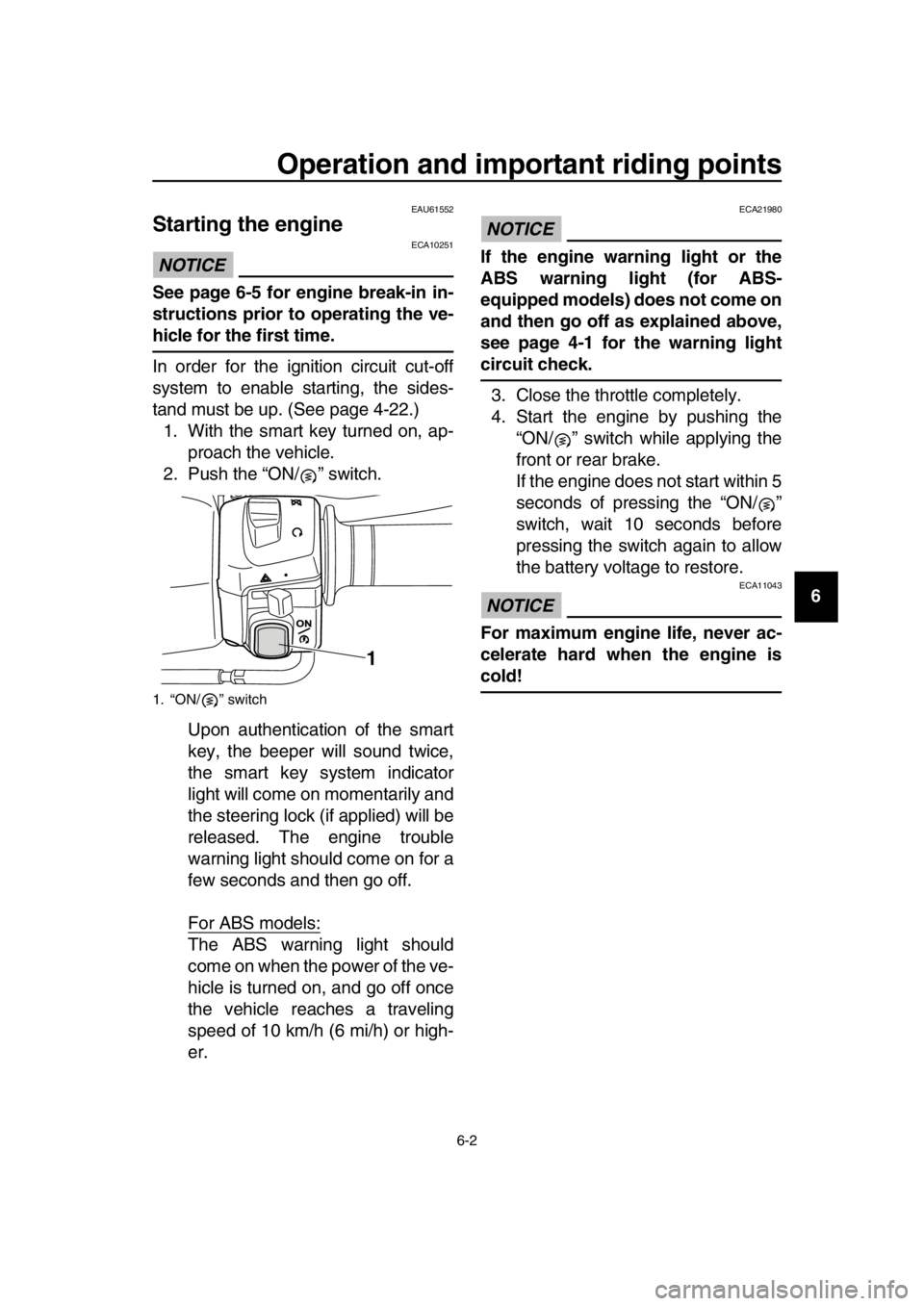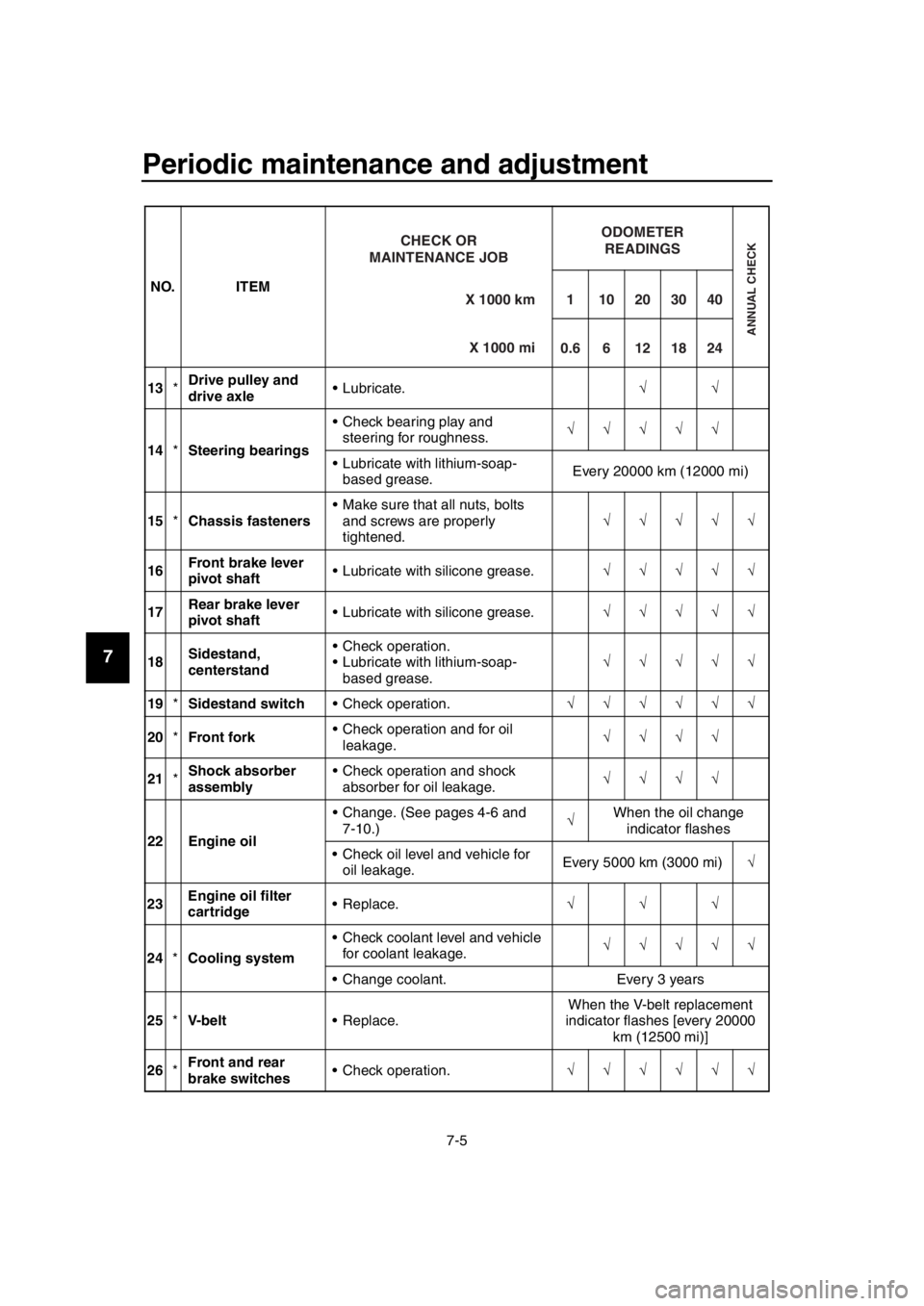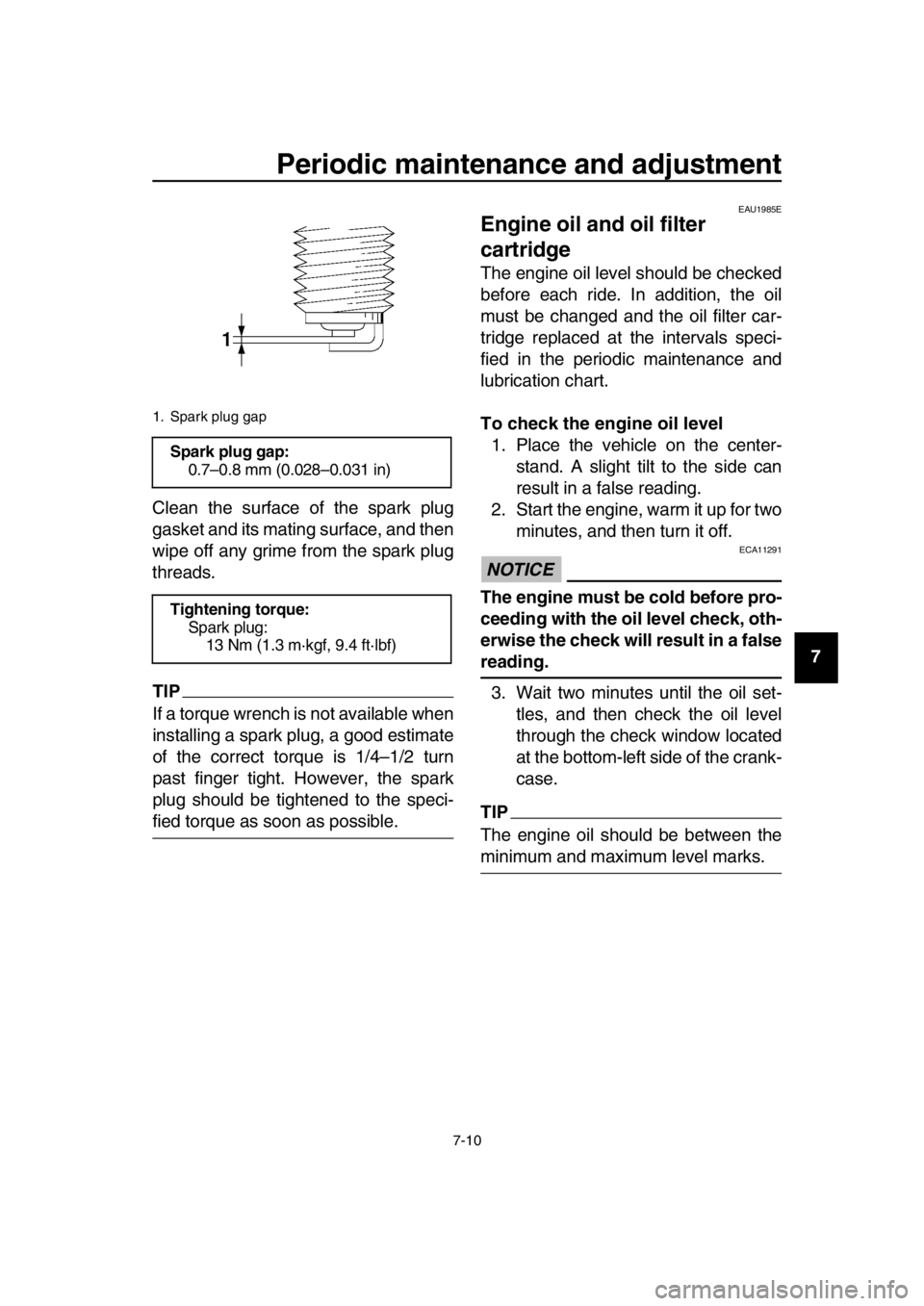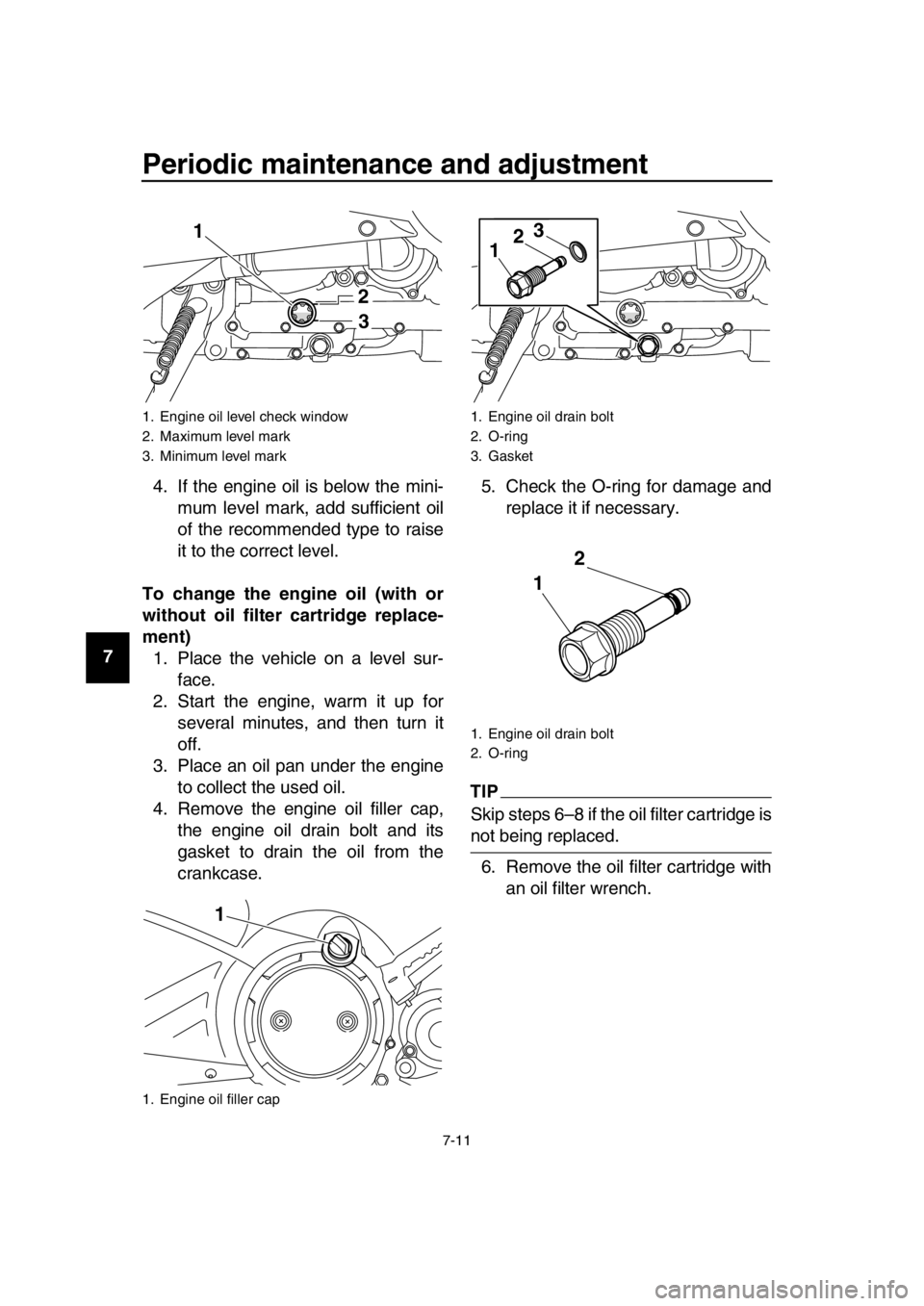check engine YAMAHA TMAX 2016 User Guide
[x] Cancel search | Manufacturer: YAMAHA, Model Year: 2016, Model line: TMAX, Model: YAMAHA TMAX 2016Pages: 110, PDF Size: 6.26 MB
Page 48 of 110

Instrument and control functions
4-23
1
2
3
4
5
6
7
8
9
10
11
12
13
14
With the engine turned off:
1. Move the sidestand down.
2. Make sure that the engine stop switch is turned on.
3. Turn the vehicle power on.
4. Keep the front or rear brake applied.
5.
Push the “ON/ ” switch.
Does the engine start?
With the engine still off:
6. Move the sidestand up.
7. Keep the front or rear brake applied.
8.
Push the “ON/ ” switch.
Does the engine start?
With the engine still running:
9. Move the sidestand down.
Does the engine stall?
The system is OK. The scooter can be
ridden.
The sidestand switch may not be
working correctly.
The scooter should not be ridden until
checked by a Yamaha dealer.
The brake switch may not be working
correctly.
The scooter should not be ridden until
checked by a Yamaha dealer.
The sidestand switch may not be
working correctly.
The scooter should not be ridden until
checked by a Yamaha dealer.
WARNING
The vehicle must be placed on the centerstand during this inspection.
If a malfunction is noted, have a Yamaha dealer check the system
before riding.
NO YES
YES NO
YESNO
2PW-9-E1.book 23 ページ 2015年9月10日 木曜日 午後5時17分
Page 50 of 110

5-1
1
2
3
4
5
6
7
8
9
10
11
12
13
14
For your safety – pre-operation checks
EAU63440
Inspect your vehicle each time you use it to make sure the vehicle is in safe oper-
ating condition. Always follow the inspection and maintenance procedures and
schedules described in the Owner’s Manual.
WARNING
EWA11152
Failure to inspect or maintain the vehicle properly increases the possibility
of an accident or equipment damage. Do not operate the vehicle if you find
any problem. If a problem cannot be corrected by the procedures provided
in this manual, have the vehicle inspected by a Yamaha dealer.
Before using this vehicle, check the following points:
ITEM CHECKSPAGE
Fuel Check fuel level in fuel tank.
Refuel if necessary.
Check fuel line for leakage.
Check fuel tank breather hose and overflow hose for
obstructions, cracks or damage, and check hose
connections. 4-15
Engine oil Check oil level in engine.
If necessary, add recommended oil to specified level.
Check vehicle for oil leakage. 7-10
Coolant Check coolant level in reservoir.
If necessary, add recomm
ended coolant to specified
level.
Check cooling system for leakage. 7-13
Front brake Check operation.
If soft or spongy, have Yamaha dealer bleed hydraulic
system.
Check brake pads for wear.
Replace if necessary.
Check fluid level in reservoir.
If necessary, add specified brake fluid to specified level.
Check hydraulic system for leakage. 7-20,
7-22
Rear brake Check operation.
If soft or spongy, have Yamaha dealer bleed hydraulic
system.
Check brake pads for wear.
Replace if necessary.
Check fluid level in reservoir.
If necessary, add specified brake fluid to specified level.
Check hydraulic system for leakage. 7-20,
7-22
Throttle grip Make sure that operation is smooth.
Check throttle grip free play.
If necessary, have Yamaha dealer adjust throttle grip
free play and lubricate cable and grip housing. 7-16,
7-25
2PW-9-E1.book 1 ページ 2015年9月10日 木曜日 午後5時17分
Page 53 of 110

Operation and important riding points
6-2
1
2
3
4
5
6
7
8
9
10
11
12
13
14
EAU61552
Starting the engine
NOTICE
ECA10251
See page 6-5 for engine break-in in-
structions prior to operating the ve-
hicle for the first time.
In order for the ignition circuit cut-off
system to enable starting, the sides-
tand must be up. (See page 4-22.) 1. With the smart key turned on, ap- proach the vehicle.
2. Push the “ON/ ” switch.
Upon authentication of the smart
key, the beeper will sound twice,
the smart key system indicator
light will come on momentarily and
the steering lock (if applied) will be
released. The engine trouble
warning light should come on for a
few seconds and then go off.
For ABS models:
The ABS warning light should
come on when the power of the ve-
hicle is turned on, and go off once
the vehicle reaches a traveling
speed of 10 km/h (6 mi/h) or high-
er.
NOTICE
ECA21980
If the engine warning light or the
ABS warning light (for ABS-
equipped models) does not come on
and then go off as explained above,
see page 4-1 for the warning light
circuit check.3. Close the throttle completely.
4. Start the engine by pushing the “ON/ ” switch while applying the
front or rear brake.
If the engine does not start within 5
seconds of pressing the “ON/ ”
switch, wait 10 seconds before
pressing the switch again to allow
the battery voltage to restore.
NOTICE
ECA11043
For maximum engine life, never ac-
celerate hard when the engine is
cold!
1. “ON/ ” switch
1
2PW-9-E1.book 2 ページ 2015年9月10日 木曜日 午後5時17分
Page 56 of 110

Operation and important riding points
6-5
1
2
3
4
5
6
7
8
9
10
11
12
13
14
EAU16821
Tips for reducing fuel
consumption
Fuel consumption depends largely on
your riding style. Consider the following
tips to reduce fuel consumption:
Avoid high engine speeds during
acceleration.
Avoid high engine speeds with no
load on the engine.
Turn the engine off instead of let-
ting it idle for an extended length of
time (e.g., in traffic jams, at traffic
lights or at railroad crossings).
EAU16842
Engine break-in
There is never a more important period
in the life of your engine than the period
between 0 and 1600 km (1000 mi). For
this reason, you should read the follow-
ing material carefully.
Since the engine is brand new, do not
put an excessive load on it for the first
1600 km (1000 mi). The various parts in
the engine wear and polish themselves
to the correct operating clearances.
During this period, prolonged full-throt-
tle operation or any condition that might
result in engine overheating must be
avoided.
EAU36532
0–1000 km (0–600 mi)
Avoid prolonged operation above 4100
r/min. NOTICE: After 1000 km (600
mi) of operation, the engine oil must
be changed, and the oil filter car-
tridge or element replaced.
[ECA11283]
1000–1600 km (600–1000 mi)
Avoid prolonged operation above 5000
r/min.
1600 km (1000 mi) and beyond
The vehicle can now be operated nor-
mally.
NOTICE
ECA10311
Keep the engine speed out of
the tachometer red zone.
If any engine trouble should oc-
cur during the engine break-in
period, immediately have a
Yamaha dealer check the vehi-
cle.
2PW-9-E1.book 5 ページ 2015年9月10日 木曜日 午後5時17分
Page 60 of 110

Periodic maintenance and adjustment
7-3
1
2
3
4
5
6
7
8
9
10
11
12
13
14
EAU46862
TIP
The annual checks must be performed every year, except if a kilometer-
based maintenance, or for the UK, a mileage-based maintenance, is per-
formed instead.
From 50000 km (30000 mi), repeat the maintenance intervals starting from
10000 km (6000 mi).
Items marked with an asterisk should be performed by a Yamaha dealer as
they require special tools, data and technical skills.
EAU63321
Periodic maintenance chart for the emission control system
NO. ITEM
1 *Fuel line Check fuel hoses for cracks or
damage.
2 *Spark plugs Check condition.
Clean and regap.
Replace.
3 *Valves Check valve clearance.
Adjust. Every 40000 km (24000 mi)
4 *Fuel injection Adjust engine idling speed and
synchronization. X 1000 km
CHECK OR
MAINTENANCE JOB
X 1000 mi
ODOMETER READINGS
ANNUAL CHECK
110203040
0.66121824
2PW-9-E1.book 3 ページ 2015年9月10日 木曜日 午後5時17分
Page 62 of 110

Periodic maintenance and adjustment
7-5
1
2
3
4
5
6
7
8
9
10
11
12
13
14
13 *Drive pulley and
drive axle Lubricate.
14 *Steering bearings Check bearing play and
steering for roughness.
Lubricate with lithium-soap- based grease. Every 20000 km (12000 mi)
15 *Chassis fasteners Make sure that all nuts, bolts
and screws are properly
tightened.
16 Front brake lever
pivot shaft Lubricate with silicone grease.
17 Rear brake lever
pivot shaft Lubricate with silicone grease.
18 Sidestand,
centerstand Check operation.
Lubricate with lithium-soap-
based grease.
19 *Sidestand switch Check operation.
20 *Front fork Check operation and for oil
leakage.
21 *Shock absorber
assembly Check operation and shock
absorber for oil leakage.
22 Engine oil Change. (See pages 4-6 and
7-10.) When the oil change
indicator flashes
Check oil level and vehicle for oil leakage. Every 5000 km (3000 mi)
23 Engine oil filter
cartridge Replace.
24 *Cooling system Check coolant level and vehicle
for coolant leakage.
Change coolant. Every 3 years
25 *V- b e l t Replace. When the V-belt replacement
indicator flashes [every 20000 km (12500 mi)]
26 *Front and rear
brake switches Check operation.
NO. ITEM
X 1000 km
CHECK OR
MAINTENANCE JOB
X 1000 mi
ODOMETER READINGS
ANNUAL CHECK
110203040
0.66121824
2PW-9-E1.book 5 ページ 2015年9月10日 木曜日 午後5時17分
Page 63 of 110

Periodic maintenance and adjustment
7-6
1
2
3
4
5
6
7
8
9
10
11
12
13
14
EAU38263
TIP
Engine air filter and V-belt air filters This model’s engine air fi lter is equipped with a disposable oil-coated paper
element, which must not be cleaned wi th compressed air to avoid damaging
it.
The engine air filter element needs to be replaced and the V-belt air filter el- ements need to be serviced more frequently when riding in unusually wet or
dusty areas.
Hydraulic brake service After disassembling the brake master cylinders and calipers, always change the fluid. Regularly check the brake fluid levels and fill the reservoirs
as required.
Every two years replace the internal components of the brake master cylin-
ders and calipers, and change the brake fluid.
Replace the brake hoses every four years and if cracked or damaged.
27 Moving parts and
cables Lubricate.
28 *Throttle grip Check operation.
Check throttle grip free play,
and adjust if necessary.
Lubricate cable and grip housing.
29 *Lights, signals and
switches Check operation.
Adjust headlight beam.
NO. ITEM
X 1000 km
CHECK OR
MAINTENANCE JOB
X 1000 mi
ODOMETER READINGS
ANNUAL CHECK
110203040
0.66121824
2PW-9-E1.book 6 ページ 2015年9月10日 木曜日 午後5時17分
Page 66 of 110

Periodic maintenance and adjustment
7-9
1
2
3
4
5
6
7
8
9
10
11
12
13
14 To install the panel
Place the panel in the original position,
and then install the screws.
EAU19643
Checking the spark plugs
The spark plugs are important engine
components, which should be checked
periodically, preferably by a Yamaha
dealer. Since heat and deposits will
cause any spark plug to slowly erode,
they should be removed and checked
in accordance with the periodic mainte-
nance and lubrication
chart. In addition,
the condition of the spark plugs can re-
veal the condition of the engine.
The porcelain insulator around the cen-
ter electrode of each spark plug should
be a medium-to-light tan (the ideal color
when the vehicle is ridden normally),
and all spark plugs installed in the en-
gine should have the same color. If any
spark plug shows a distinctly different
color, the engine could be operating im-
properly. Do not attempt to diagnose
such problems yourself. Instead, have
a Yamaha dealer check the vehicle.
If a spark plug shows signs of electrode
erosion and excessive carbon or other
deposits, it should be replaced.
Before installing a spark plug, the spark
plug gap should be measured with a
wire thickness gauge and, if necessary,
adjusted to specification.
1. Screw
2. Panel D
1
2
1
Specified spark plug:
NGK/CR7E
2PW-9-E1.book 9 ページ 2015年9月10日 木曜日 午後5時17分
Page 67 of 110

Periodic maintenance and adjustment
7-10
1
2
3
4
5
6
7
8
9
10
11
12
13
14
Clean the surface of the spark plug
gasket and its mating surface, and then
wipe off any grime from the spark plug
threads.
TIP
If a torque wrench is not available when
installing a spark plug, a good estimate
of the correct torque is 1/4–1/2 turn
past finger tight. However, the spark
plug should be tightened to the speci-
fied torque as soon as possible.
EAU1985E
Engine oil and oil filter
cartridge
The engine oil level should be checked
before each ride. In addition, the oil
must be changed and the oil filter car-
tridge replaced at the intervals speci-
fied in the periodic maintenance and
lubrication chart.
To check the engine oil level
1. Place the vehicle on the center- stand. A slight tilt to the side can
result in a false reading.
2. Start the engine, warm it up for two minutes, and then turn it off.
NOTICE
ECA11291
The engine must be cold before pro-
ceeding with the oil level check, oth-
erwise the check will result in a false
reading.
3. Wait two minutes until the oil set- tles, and then check the oil level
through the check window located
at the bottom-left side of the crank-
case.
TIP
The engine oil should be between the
minimum and maximum level marks.
1. Spark plug gap
Spark plug gap:0.7–0.8 mm (0.028–0.031 in)
Tightening torque: Spark plug:
13 Nm (1.3 m·kgf, 9.4 ft·lbf)
2PW-9-E1.book 10 ページ 2015年9月10日 木曜日 午後5時17分
Page 68 of 110

Periodic maintenance and adjustment
7-11
1
2
3
4
5
6
7
8
9
10
11
12
13
14 4. If the engine oil is below the mini-
mum level mark, add sufficient oil
of the recommended type to raise
it to the correct level.
To change the engine oil (with or
without oil filter cartridge replace-
ment) 1. Place the vehicle on a level sur- face.
2. Start the engine, warm it up for several minutes, and then turn it
off.
3. Place an oil pan under the engine to collect the used oil.
4. Remove the engine oil filler cap, the engine oil drain bolt and its
gasket to drain the oil from the
crankcase. 5. Check the O-ring for damage and
replace it if necessary.
TIP
Skip steps 6–8 if the oil filter cartridge is
not being replaced.
6. Remove the oil filter cartridge with an oil filter wrench.
1. Engine oil level check window
2. Maximum level mark
3. Minimum level mark
1. Engine oil filler cap
1
23
1
1. Engine oil drain bolt
2. O-ring
3. Gasket
1. Engine oil drain bolt
2. O-ring
1 2
3
1 2
2PW-9-E1.book 11 ページ 2015年9月10日 木曜日 午後5時17分